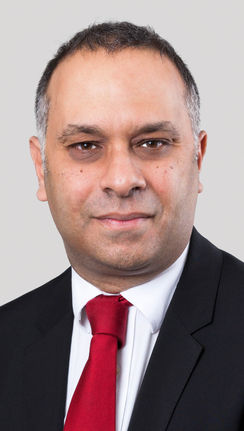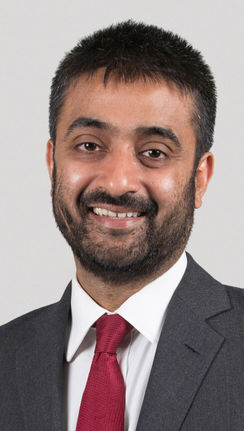Confiscation & Restraint Solicitors
The consequences of restraint and confiscation orders can be far reaching – affecting not only the person accused of criminal activity, but their family, friends and business associates.
Confiscation and Restraint Proceedings are when your assets are seized in a criminal investigation. They are started by the authorities under the Proceeds of Crime Act 2002 (POCA).
The POCA allows a prosecuting authority to apply to the court to freeze (restrain) a person’s assets while an investigation is ongoing, and the property is believed to be the benefit of criminal conduct.
 Our Crime team have been ranked in the Chambers & Partners 2025 legal directory. The team was described as “experienced in financial crime” and were praised for their excellent “level of service and responsiveness.”
Our Crime team have been ranked in the Chambers & Partners 2025 legal directory. The team was described as “experienced in financial crime” and were praised for their excellent “level of service and responsiveness.”
 “HJA’s fraud team is distinct in the market due to its longstanding experience of its senior lawyers on a wide range of matters, prosecuted by multiple agencies. They work closely with their general crime team, as well as disputes that feed into other closely linked areas of law, such as civil disputes and employment.” – Legal 500, 2025
“HJA’s fraud team is distinct in the market due to its longstanding experience of its senior lawyers on a wide range of matters, prosecuted by multiple agencies. They work closely with their general crime team, as well as disputes that feed into other closely linked areas of law, such as civil disputes and employment.” – Legal 500, 2025
we can help.
0330 822 3451request a call back.
What is the purpose of confiscation and restraint proceedings?
The purpose is to preserve any assets (such as a home or car) which may be the subject of confiscation proceedings following a conviction. The Order will prevent them being disposed of.
Assets can be restrained for years while the criminal investigation and proceedings are resolved. If convicted, the funds subject to confiscation can exceed the amount a person has benefitted from crime.
Why choose Hodge Jones & Allen?
Hodge Jones & Allen has a long history of successfully challenging Confiscation and Restraint Orders. This is a technical area of law and our specialist restraint and confiscation lawyers have the expertise to help you and your family get the best possible outcomes. We can also provide support to family members and business associates who may have been affected.
We identify issues relating to confiscation early in the process and have an overview of your case from the start. This is because the best way to avoid confiscation is to make sure that you are not convicted of any offence.
If you’re faced with criminal proceedings which could end in confiscation, contact us for the advice of our award-winning team right away. How your defence is conducted matters hugely in the following stages and we begin to proactively think about the possibility of confiscation proceedings from the moment that you get in touch with us.
For decades, we have built up contacts and relationships with leading barristers, forensic accountants and business experts to ensure that if you instruct us, we will always support you with the best possible team to ensure the lowest possible confiscation order is given.
"THEY REALLY GAVE THE BEST HELP. THEY KEPT IN TOUCH QUITE OFTEN AND WAS EXTREMELY HELPFUL. I RECOMMEND THEM FULLY."
Will I be notified that the prosecution are going to apply for a restraint order?
Prosecuting authorities can apply for a Restraint Order against a criminal suspect or connected person – including innocent third parties – without notifying them. They usually do this at an early stage in a criminal investigation to preserve assets to meet any Confiscation Order made following conviction.
In addition to not having to notify the subject of the application for Restraint, the prosecutor needs only to have to pass a very low threshold in securing a Restraint Order. It must be shown on the balance of probabilities that the property is linked to criminal conduct and there is a risk that if the Restraint Order is not granted, the property and assets will be dissipated. An application for Restraint is usually accompanied by a witness statement from the law enforcement official setting out the reasons for the applications.
What happens if I cannot pay my Confiscation Order
If a high confiscation order is imposed and you cannot pay it, then you will face the prospect of spending more time in prison. When the Order is made, a default sentence is set by the Judge which must be served if payment is not made. A guide to the length is set out here:
Amount unpaid:
- £10,000 or less – Up to 6 months*
- More than £10,000 but no more than £500,000 – Up to 5 years*
- More than £500,000 but no more than £1 million – Up to 7 years*
- More than £1 million – Up to 14 years
*Maximum Term
The maximum time that a Court can grant to pay the Order is 6 months in total. After this, interest on the unpaid amount will accrue.
What are hidden assets?
A particular cause for concern is the assertion by the prosecution in confiscation proceedings that the defendant has ‘hidden assets’. If the Court agrees, the value of that hidden asset will be considered available to pay towards the Confiscation Order. This means defendants face the difficult task of proving a negative – that they do not hold these funds or assets.
At HJA we have unrivalled experience of a wide variety confiscation proceedings in the context of high value drugs and fraud offences. This means we are very well placed to help you navigate these issues. We make sure that we identify any point that can be deployed in your favour to avoid facing the nightmare of serving additional unjustified time in prison.
Can you negotiate with prosecution authorities in relation to these proceedings?
We are experienced negotiators when it comes to confiscation proceedings. We have often secured outstanding agreements for Confiscation Orders far lower than originally applied for by the prosecution – often just a mere fraction.
This is through meticulous planning and preparation of your confiscation case, identifying and securing all possible avenues of evidence to support your case and then deploying these to negotiate the best settlement with the prosecuting authority.
Do the prosecution have to prove that these assets are from criminal activity?
Defendants are frequently alarmed to learn that the value of the Confiscation Order applied for by the prosecution exceeds their benefit from the crime they were convicted of. In stark distinction to criminal proceedings, where the burden falls on the prosecution to prove the case against a suspect beyond all reasonable doubt, this burden reserves in confiscation proceedings.
A defendant must prove they don’t have the assets that the prosecution assert they do, likewise that they have not benefited from criminal conduct by as much as the prosecution assert. It is vital to have specialist lawyers to advise you.
What happens if the prosecution are trying to confiscate an asset which does not belong to me or it is my asset and I am not party to the proceedings?
If it is not your asset, but your partners or someone else owns the asset, they can intervene in the proceedings to make sure that it does not get confiscated. We have successfully represented innocent third parties in this context to ensure that their assets are preserved and not unfairly confiscated when they have done nothing wrong.
Can the prosecution apply for confiscation of assets that have not come from the criminal activity that I have been convicted of?
Yes, the prosecution can ask the Court to consider that a convicted person has been leading a “criminal lifestyle” over and above what they have been convicted of. This can trigger what is known as “statutory assumptions” namely that any money or assets that have passed through a convicted person’s hands during the six years before the day on which the defendant was charged is the proceeds of crime.
If the Court makes this finding, that money and assets can be confiscated. That can be a terrifying prospect – to potentially lose the money and assets that you have worked hard to acquire. We have the expertise and knowledge to seek support you and present your case that to proceed in this way would be unfair.





















